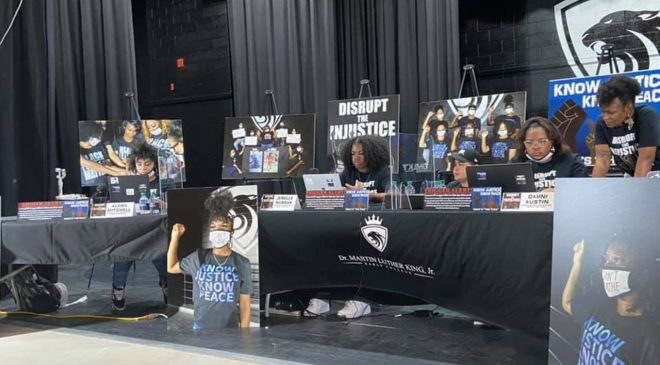
Black students who are forced to study a glossed-over version of US history will inevitably internalise anti-Black racism. Racism isn’t just a US problem; to fight it in the UK we need to change how it’s taught in schools. At a press event in Utah on July 21, GOP presidential contender and Florida Governor Ron DeSantis attempted to find the silver lining of American chattel slavery. “Some of the folks … eventually parlayed, you know, being a blacksmith into doing things later in life,” he said, referring to enslaved people. DeSantis made these utterings while defending the Florida State Board of Education’s new standards for teaching African American history in public schools, which downplay and whitewash the enslavement of Africans in the Americas.
As a reminder, slavery in the United States was a 246-year-long apocalypse of kidnapping 300,000 African people, transporting them across the Atlantic, beating, torturing and raping them, and working them to their early deaths. The racist idea that slavery was a positive experience of self-improvement for enslaved Africans is not new. It is the same racist reasoning the United States’ third president, Thomas Jefferson, used 240 years ago in his 1785 Notes on the State of Virginia, where he wrote that many enslaved Africans “have been brought up to the handicraft arts” under the tutelage of “the whites”. It is the same reasoning American abolitionist and writer Frederick Douglas pushed back on in 1845, when he criticised the myth of the “happy slave”.
Elsewhere, it has been documented: “African men with iron making skills were imported to the Chesapeake [in the state of Virginia] to work as blacksmiths … Ironworkers were an elite group in West and West Central Africa.” There is plenty of historical evidence to disprove the ridiculous claim that the Florida State Board of Education is trying to push about slavery. But this is by far not the only problem with its new curriculum standards. With language like “positive contributions” and “African patriots”, it is trying to veer away from addressing the horrific realities and effects of slavery, Jim Crow, redlining, and white vigilantism. Glossing over the brutal history of US slavery will only increase anti-Blackness in the near term by signalling that anything said, written, done, or experienced by Black people in the US matters not and instead deserves erasure and marginalisation. It will also promote internalised racism among African Americans in the long run. The racism as exhibited in “anti-woke” curricula and in book bans in Florida and across the US will reinforce anti-Blackness for yet another generation of children. DeSantis is hardly alone in his attacks, for which there has been much precedent. There was a brief effort in 2022 to get the Texas State Board of Education to call slavery the “involuntary relocation of African people during colonial times” in the state’s social studies curriculum for public schools, an effort the board rejected. A year earlier, the state passed legislation banning schools from teaching any materials that may cause an individual to “feel discomfort, guilt, anguish, or any other form of psychological distress on account of the individual’s race or sex”. Texas Governor Greg Abbott, who signed it into law, said at that time that more needed to be done to “abolish” CRT.
In Florida, nearly 21 percent of public school students are Black; in Texas, they are 13 percent. Overall, 7.4 million African Americans attend public schools across the US. The rhetoric and legislation DeSantis, Abbott, and other politicians are pushing aim to appeal to white supporters terrified of living in a majority-of-colour nation that could threaten their economic and political power. They serve to whitewash the truth of the Black experience in the US and the endemic nature of American racism. They are deliberately anti-Black. In this context, any curriculum that emphasises that slavery existed elsewhere or that some enslaved Black folk learned a trade is denying their students the opportunity to think critically about their past, present, and future. This kind of education and the racist rhetoric that supports it insinuate that the truth of the Black past does not matter, that their education and full development as human beings in a multiracial society does not matter.
What is clear is that as attacks from DeSantis, Abbott, and so many others continue, state education departments across the country will continue to revise curricula and ban books they deem anti-racist. It means a lack of representation of Black authors, Black intellectuals, Black ideas and Black experiences for millions of African American kids. It means a paternalistic and racist misrepresentation of the horrors of slavery and of the resilience it took for enslaved Black folk to build a culture of resistance that would foster social justice movements and cultural creation worldwide once emancipation finally occurred. It means that even the knowledge of such resistance and innovation, including the path to the Brown v Board of Education ruling, could be marginalised or erased at the whim of an “anti-woke” politician or state school board.
DeSantis, Abbott, and many others have declared that anti-racist teaching is “teaching kids to hate this country”. My own intellectual evolution, though disillusioning, would not have occurred without the help of education about systemic racism and its deep roots in the US and in the West. Learning about the history of humans is hard, it is uncomfortable, especially when one is confronted with truths that expose the lies one learns at an earlier age. But it freed me to think in counterintuitive ways about Blackness and about the world. Disillusioning white kids by teaching them the ugly history of American racism is not teaching hate, but not teaching the truth of the Black experience is certainly teaching anti-Blackness to Black students.
